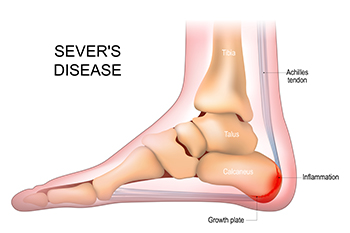

Sever's disease, also known as calcaneal apophysitis, is a common condition affecting children and adolescents, particularly those engaged in physical activities such as running or jumping. It occurs when the growth plate at the back of the heel bone becomes inflamed due to repetitive stress or tension. The growth plate, known as the calcaneal apophysis, is a vulnerable area where new bone forms as children grow. Common causes of Sever's disease include overuse, rapid growth spurts, and participation in high-impact sports that place excessive strain on the heel bone. Symptoms typically include heel pain, especially during physical activity or when pressing the affected area. Children may also experience swelling and tenderness at the back of the heel. Those participating in sports or activities involving repetitive pounding on hard surfaces are at higher risk of developing Sever's disease. If you notice your active child has heel pain or is limping, it is suggested that you consult a podiatrist who can diagnose and treat Sever’s disease and other foot problems.
Sever's disease often occurs in children and teens. If your child is experiencing foot or ankle pain, see Dr. Stephan J. LaPointe from Georgia Foot & Ankle Specialists . Our doctor can treat your child’s foot and ankle needs.
Sever’s Disease
Sever’s disease is also known as calcaneal apophysitis, which is a medical condition that causes heel pain I none or both feet. The disease is known to affect children between the ages of 8 and 14.
Sever’s disease occurs when part of the child’s heel known as the growth plate (calcaneal epiphysis) is attached to the Achilles tendon. This area can suffer injury when the muscles and tendons of the growing foot do not keep pace with bone growth. Therefore, the constant pain which one experiences at the back of the heel will make the child unable to put any weight on the heel. The child is then forced to walk on their toes.
Symptoms
Acute pain – Pain associated with Sever’s disease is usually felt in the heel when the child engages in physical activity such as walking, jumping and or running.
Highly active – Children who are very active are among the most susceptible in experiencing Sever’s disease, because of the stress and tension placed on their feet.
If you have any questions, please feel free to contact our office located in Rome, GA . We offer the newest diagnostic and treatment technologies for all your foot and ankle injuries.